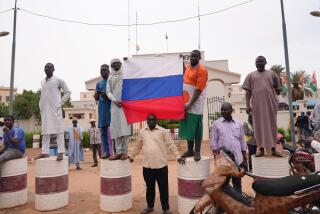Egyptâs president says diplomacy by U.S., others fails to end crisis
CAIRO -- Egyptâs acting president announced Wednesday that diplomatic efforts to resolve the nationâs political crisis have failed, raising the prospect of renewed violence and a crackdown on thousands of Islamist protesters supporting deposed president Mohamed Morsi.
The statement by President Adly Mahmoud Mansour followed days of intense efforts by the U.S., Europe and Arab states to end the political standoff between the military-backed government and Morsiâs Muslim Brotherhood movement, which for weeks has staged a sit-in at the Rabaa al Adawiya mosque in Cairo.
âThe diplomatic phase has ended,â said the statement from Mansourâs office. He blamed the Brotherhood for continued bloodshed and chaos, adding that the international efforts âhave not fulfilled the hoped-for success, despite the full support of the Egyptian government to facilitate the path to a stable and safeâ political transition.
The tone of the statement indicates that Egypt is sliding deeper into crisis. The Brotherhood has refused to recognize the new government, saying the coup that overthrew Morsi last month shattered the countryâs pretense of democracy. The government has jailed much of the Brotherhoodâs leadership and is adamant about keeping to a âpolitical roadmapâ to amend the Islamist-drafted constitution and hold parliamentary elections early next year.
The intransigence on both sides has increased the chances that security forces might storm the sit-ins at Rabaa and Cairo University, where protesters have vowed to stay until Morsi is reinstated. A crackdown would likely lead to many casualties and fresh condemnation from human rights groups, which have blamed the military and police for more than 200 deaths in recent weeks.
Mansour said the government âholds the Muslim Brotherhood fully responsible for ruining [diplomatic] efforts, and for whatever repercussionsâ may arise. He did not say what the governmentâs next move would be, but security forces have threatened to shut down the sit-ins with a blockade and other measures.
The government stance âtoday was expected because it was obvious that reaching a middle ground was becoming very difficult,â said Ziad Aql, a senior analyst at the Al Ahram Center for Political and Strategic Studies. âItâs an early signal that there will be some kind of forceful action to disperse the sit-ins.â
The presidentâs announcement comes the day after Sens. John McCain (R-Ariz.) and Lindsey Graham (R-S.C.) joined a number of diplomats seeking a way out of a political stalemate that has gripped the Arab worldâs most populous country and raised new concerns about the future of democracy in a region where Islamists and secularists are vying for power.
Over the last two days, envoys have suggested that the likelihood of a negotiated settlement was fading.
Egypt should release âthe political prisoners as soon as possible because they are the key to unlocking this crisis,â Khaled al-Attiya, Qatarâs foreign minister and a Brotherhood ally, told Al Jazeera. âWithout a serious dialogue with all the parties, and, most importantly, with the political prisoners because they are the main element in this crisis, I believe things will be difficult.â
Cairo has bristled at foreign efforts to end the crisis, suggesting that diplomats overstepped their bounds while failing to persuade the Brotherhood to soften its demands and accept a political reconciliation. The ordeal has highlighted Egyptâs intensifying political divide and left the army, which has called Brotherhood supporters terrorists, as the arbiter of what happens next.
Morsiâs one year in power was marked by protests and economic turmoil that overwhelmed him and the Brotherhood. Public anger against Morsi deepened over what many Egyptians regarded as the Brotherhoodâs agenda to turn Egypt into a state governed by Islamic law. The final push against him began with massive protests on June 30 that days later culminated in a coup.
Mansourâs statement came a day before the Eid feast, which ends the fasting month of Ramadan. He said that in the spirit of the holy celebration, the government was willing to accept Brotherhood supporters âwith forgiveness and peacefulnessâ if they ended their protests.
ALSO:
U.S. has filed charges in Benghazi attack
Israeli soldiers hurt in Lebanese border explosion
Drone strike in Yemen kills 4 suspected Al Qaeda militants
Special correspondent Ingy Hassieb contributed to this report.
More to Read
Sign up for Essential California
The most important California stories and recommendations in your inbox every morning.
You may occasionally receive promotional content from the Los Angeles Times.










